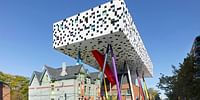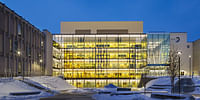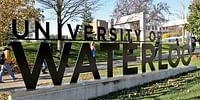- PhD in Renewable Resources at the University of Alberta allows students to complete this course in 2 years.
- It is an on-campus, thesis-based program offered on a full-time basis.
- The program discovers and disseminate new knowledge about forests, rangelands, crops, wildlife, soils, and water.
- The different degrees offered the department of the university is:
- Master of Agriculture (Course-based)
- MBA-MAg (Course-based)
- MBA-MF (Course-based)
- Master of Forestry
- Master of Science (Thesis-Based)
- Doctor of Philosophy (Thesis-based)
- Graduate students can select from 18 thesis-based or course-based degrees in five different topic areas.
- The topics areas are Conservation Biology, Forest Ecology and Management, Agriculture and the Environment, Reclamation and Restoration of Land and Water, and Environmental Soil Science.
- The student-faculty ratio for this program is 21:1.
- The major research areas of the Renewable Resources program are:
- Biodiversity Conservation
- Enhanced Forest Management
- Environmentally Sustainable Agriculture
- Land Reclamation, Remediation, and Restoration
- Soil Science
- The University of Alberta offers many scholarship opportunities to undergraduate and graduate students with outstanding academic potential.
- The Renewable Resources Distributed Learning Centre is a multi-use, high-tech, smart video classroom designed to facilitate distributed learning, research collaboration, and professional education.
- The Faculty of Agricultural, Life and Environmental Sciences at the University of Alberta provides solutions to global challenges in the areas of agriculture, nutrition, the environment, and human ecology.
- It conducts a robust research program that provides solutions to global challenges in the areas of agriculture and food, the environment, community and individual well-being, and bioresource innovation.
- Job opportunities after PhD in Renewable Resources are Green Construction Manager, Renewable Energy Consultant, etc and the average salary goes up to 42,000 USD.
Doctor of Philosophy [Ph.D] (Renewable Resources)
4 years
On Campus
English
Field of Study:
Offered By:
Faculty of Graduate Studies & Research, University of Alberta
CA$6,525/Yr
CA$6,525 /Yr
Important Dates
| Event | End Date |
| Application Deadline For Summer 2023 Intake | Mar 15, 2023 |
| Application Deadline For Fall 2024 Intake | May 15, 2023 |
| Application Deadline For Winter 2023 Intake | May 15, 2023 |
| Application Deadline For Spring 2024 Intake | Dec 1, 2023 |
Fees & Funding
Tution & Application Fees
| Year | Year 1 | Year 2 | Year 3 | Year 4 |
| Tuition Fees | CA$6525 | CA$6525 | CA$6525 | CA$6525 |
| Total Fees | CA$6525 | CA$6525 | CA$6525 | CA$6525 |
Living Costs
| Head | Avg Cost Per Year |
| Housing | CA$10800 |
| Food | CA$2700 |
Eligibility & Entry Requirement
Academic Eligibility:
- Students are required to have completed a master degree, or its academic equivalent, from an academic institution, recognized by the University of Alberta.
- Students must have a minimum GPA of 3.0 (B Grade) on the University of Alberta's 4-point scale based on the recent two years of full-time study.
Indian Student Eligibility:
Indian students are eligible to apply if they meet one of the following eligibility criteria:
- Students must complete a 4-year UG degree with a 60% score i.e first-class division in a relevant field from a recognized institution.
- GPA of 3.0/4.0 (B Grade) based on the recent two years of full-time study (or equivalent) is required.
Along with the minimum eligibility requirements, international students hailing from non-English speaking countries need to prove English proficiency through IELTS/TOEFL/any equivalent test.
Scores Required
Required Document List
Following are the required documents:
- CV/Resume: Outline of academic achievements and/or awards, publications, relevant work, and/or volunteer experience.
- Transcripts: Submit copies of official transcripts from post-secondary institutions attended in PDF format.
- Reference Form/Letter: Three reference forms and letters of recommendation completed and uploaded by referees (Teachers, guidance counsellors, or Professors) directly to the online portal.
- Research Proposal: 2-5 page description of the proposed research project, outlining the relevant legal issues, preliminary arguments, and the proposed research methodology.
- Statement of Intent: Reasons or intentions for pursuing studies in this program, including a description of prior experience.
- Statement of Motivation: It is one that connects areas of interest and career goals, as well as past education and work experience, with the programs offered and the work being done at the University of Alberta.
- ELP Scores: Students have to submit their English language proficiency scores like IELTS, TOEFL or other test scores.
Career and Placement after Course
Following are the career opportunities for the students:
- Green Construction Manager
- Renewable Energy Consultant
- Solar Project Manager
- Wind Farm Site Manager
- Renewable Energy Sales Representative
Ask your question
Similar Colleges You Might Be Interested In
- Similar Colleges
No Ratings Found!!
Follow
No Ratings Found!!
Follow
No Ratings Found!!
Follow
No Ratings Found!!
Follow
No Ratings Found!!
Follow
No Ratings Found!!
Follow




.jpeg?tr=h-100,w-200,c-force)







